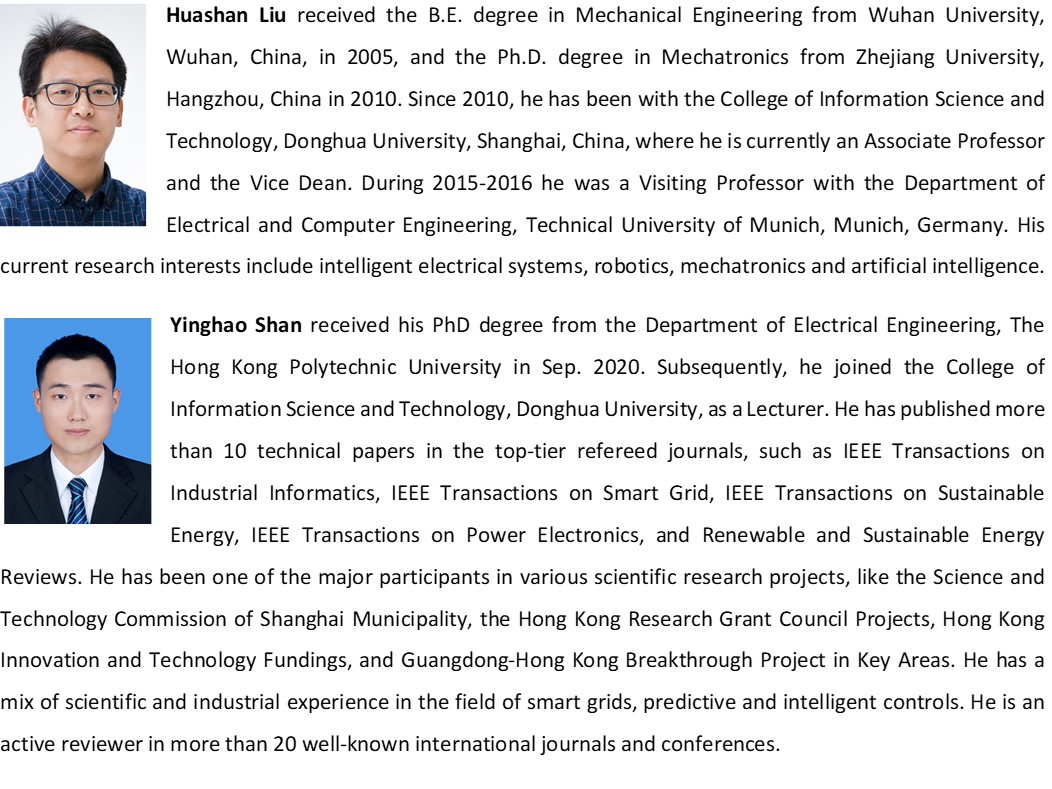2022 Asia Power and Electrical Technology Conference
(APET 2022)
亚洲电力与电气技术会议
November 11-13, 2022 • Shanghai, China
2022年11月11-13日, 中国上海
2022 Asia Power and Electrical Technology Conference
(APET 2022)
亚洲电力与电气技术会议
November 11-13, 2022 • Shanghai, China
2022年11月11-13日, 中国上海
Special Session/ 专题分会
Special Session 1: Advanced Control and Optimal Management of Cyber-Physical Smart Grids
Organizers: Huashan Liu, Donghua University, hsliu@dhu.edu.cn ; Yinghao Shan, Donghua University, shanyh@dhu.edu.cn
Submit your paper via http://www.easychair.org/conferences/?conf=apet2022, and choose Special Session 1 option.
The smart grid, a typical cyber-physical system, can provide a new paradigm to flexibly and intelligently integrate various participants that relate to power generation, transmission, distribution, and consumption. To a certain extent, the research of smart grids determines the future development direction of the electric power grid. In China, responding to the national mission goal of "Carbon Peak and Carbon Neutralization", smart grids can be an efficient way to solve energy security and environmental problems. However, smart grid needs effective power control and management to support the normal operation of this complex cyber-physical system. As to the control of smart grids, various methods such as predictive control, resilient control, robust control, and hierarchical control have been used recently. They are common to be seen in the area of power electronics, power converters, and communication links based on the modelling and analysis of smart grid components. The involvement of renewable energy sources, energy storage systems, and plug-in electric vehicles are mostly based on power electronics, which can considerably complicate system dynamics and reduce system inertia. Thus, power management is also an importmant topic that usually considers various and multiple restricted conditions inside and outside smart grids. Therefore, the control and management need to be deeply developed for the further development of smart grids. Besides, smart grid due to its cyber information property suffers from potential cyber-attacks such as data manipulation and false data injection. It is necessary to carry out the detection, defense, modelling, and analysis work for the cyber-attacks in smart grids. Thus to design appropriate control and operation measures to improve the system reliability, resilience, and efficiency. Uncertain renewable generations such as PV systems as well as load response of consumers have increased the difficulties for system planning and operation, which also deserves an in-depth investigation.
This special session aims to present the state-of-the-art research work on the advanced control and optimal management of cyber-physical smart grids. Topics of presentations and research papers include but are not limited to:
- Advanced Predictive Control/Resilient Control/Robust Control/Hierarchical Control of Smart Grids
- Optimal Power Flow Management/Economic Dispatch of AC/DC/Hybrid Smart Microgrids
- Modelling and Analysis of Cyber-Physical System of Renewable Energy Systems
- Distributed Event-Triggered/Consensus-Based Secondary Control of Microgrids
- Detection/Defense/Modelling/Analysis for Cyber-Attacks in Smart Grids
- Efficient Forecasting Methods for Renewable Power Generation/Residential Load Prediction
- Design and Control of Power Electronics/Power Converters/Communication Links of Smart Grids
- Development/Application of Artificial Intelligence Algorithms for Cyber-Physical Smart Grids
